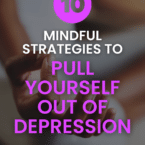
Depression can be like a heavy blanket, wrapping around you and pulling you into a seemingly endless abyss of sadness, fatigue, and isolation. But here’s the thing about blankets – no matter how heavy they are, you can still pull them off. One way to do this is through mindfulness. As we venture into this article, we’ll explore ten mindful strategies to help you dig yourself out of depression.
Mindfulness refers to the practice of being completely present and engaged in the here and now. It’s about observing your feelings, thoughts, and experiences without judgment. As a method of managing depression, mindfulness works by creating space around depressive thoughts and feelings, enabling you to observe them without getting pulled under.
Understanding Mindfulness
Before we dive into the mindful strategies, let’s take a moment to understand mindfulness. Originating from Buddhist traditions, mindfulness has been secularized and recognized as a potent tool in psychological therapy, particularly in Cognitive-Behavioral Therapy (CBT) and Mindfulness-Based Cognitive Therapy (MBCT).
To be mindful means to be fully present, aware of where we are and what we’re doing, not overly reactive or overwhelmed by what’s going on around us. This mental state can be achieved by focusing on your senses and accepting the present moment without judgment or desire for change.
10 Mindful Strategies to Dig Yourself Out of Depression
1. Start With Breath: Mindful Breathing
Mindful breathing is the cornerstone of any mindfulness practice. Sit in a quiet, comfortable place. Close your eyes and take slow, deep breaths. Notice how the air fills your lungs and how it feels as it exits. If your mind wanders, gently bring it back to your breath. Practicing this for even just a few minutes a day can calm your mind and provide a sense of peace.
2. Body Scan: Tuning Into Your Body
The body scan is a simple and effective mindfulness exercise. Lie down and mentally scan your body from top to bottom. Notice any sensations – warmth, cold, tension, relaxation. Don’t try to change these sensations; simply observe them. This practice can help you reconnect with your physical presence, grounding you in the present.
3. Mindful Eating: Savor Your Food
How often do we gobble down our food while scrolling through our phones? Instead, try eating mindfully. Pay attention to the taste, texture, and aroma of your food. Chew slowly, savoring each bite. Not only can this make meals more enjoyable, but it can also help regulate your appetite and digestion.
4. Nature Walks: Connect With the World Around You
Spend some time in nature. As you walk, pay attention to the feel of the ground under your feet, the rustle of leaves in the wind, the chirping of birds. Mindful walks can be a balm for a restless mind, providing sensory stimulation that can bring you back to the present.
5. Mindful Listening: Tune Into the Sounds
Listen to some calming music or natural sounds. Pay close attention to the different notes, the rise and fall of the melodies, or the rhythm of the rain or waves. This simple act can be incredibly soothing and can help you practice focusing your attention.
Related: 7 Ways Physical Activity Can Lift You Out of Depression >>
6.Mindful Movements: Incorporate Mindfulness Into Physical Activities
Activities like yoga or Tai Chi, where focus and intentionality are key, can be a great way to practice mindfulness. As you move, pay attention to how your body feels, the stretch of your muscles, and the rhythm of your breath.
7. Cultivate Mindfulness Through Meditation
Guided mindfulness meditations are widely available online and can be a great starting point for cultivating a meditation practice. Regular meditation can enhance your ability to focus and may help reduce the frequency and intensity of depressive thoughts.
8. Mindful Journaling: Putting Thoughts on Paper
Journaling can be a way to practice mindfulness by focusing on your thoughts and feelings without judgment. As you write, don’t worry about grammar or punctuation. Instead, let your thoughts flow freely onto the paper.
9. Gratitude Practice: Focus on the Positive
Each day, write down three things you’re grateful for. They can be big or small. This practice shifts your focus from negative thoughts to positive ones, cultivating a more optimistic mindset.
10. Progressive Muscle Relaxation: Release the Tension
This technique involves tensing and then releasing different muscle groups in your body. As you do this, you bring a heightened level of awareness to physical sensations and can promote deep relaxation.
Final Thoughts
Mindfulness won’t make depression disappear overnight. But with consistent practice, it can help you manage depressive thoughts and feelings, giving you tools to help dig yourself out of depression. Remember, it’s always okay to reach out for help. Mindfulness practices are not a substitute for professional help if you’re dealing with major or persistent depression.
Resources
If you’re feeling suicidal or need immediate help, please reach out to a trusted professional or contact a crisis line like the National Suicide Prevention Lifeline at 1-800-273-TALK (1-800-273-8255) or use the Crisis Text Line by texting HOME to 741741 (United States).
For more information on mindfulness practices, check out resources like Mindful.org or the apps Headspace and Calm. For depression and mental health resources, consider websites like the National Institute of Mental Health or the American Psychiatric Association.
Remember, there’s no shame in struggling, and there’s no shame in seeking help. You’re not alone in your journey, and with time, patience, and the right tools, you can navigate your way through depression and towards brighter days.
















